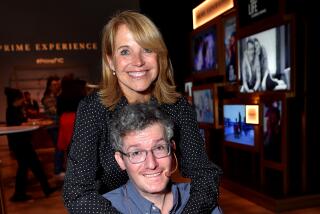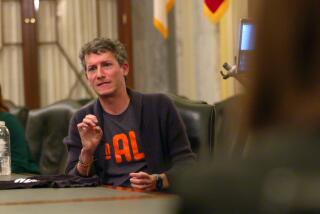John Wallach, 59; Foreign Correspondent, Peace Activist
- Share via
John Wallach, a foreign correspondent whose views of Middle East violence inspired him to start a camp for teenagers from warring lands, died Wednesday of lung cancer at his home in New York City. He was 59.
As the foreign editor for Hearst Newspapers from 1968 to 1994, Wallach broke several stories related to the Iran-Contra affair and the CIA’s covert mining of Nicaraguan waters. He received the National Press Club’s highest honor.
But it was for his work with Seeds of Peace that he was awarded the United Nations’ UNESCO Peace Prize in 1996 and was honored by Jordan’s King Hussein with the Legion of Honor of the Hashemite kingdom.
“With the Seeds of Peace, John pierced the future, because he concluded that today’s adults were not succeeding in finding a peace process. And he thought maybe it’ll be the next generation that’ll make it,” said CNN commentator Bernard Kalb, who covered the State Department alongside Wallach.
The 1993 bombing of the World Trade Center inspired Wallach to give up journalism and propose that Israeli, Egyptian and Palestinian youths meet at a camp on neutral soil: the United States.
“I was disturbed by the dehumanization of the Palestinians,” Wallach, the son of German Jews, told students at Middlebury College in Vermont in 1999. “After all, the Jews were dehumanized by the Nazis. That made it easier to kill them.”
The Israeli and Egyptian governments and officials of the Palestine Liberation Organization agreed to Wallach’s plan, and each summer since 1993, the Maine woods have welcomed hundreds of Arab and Israeli teenagers who meet their so-called enemies.
Seeds now has 1,600 graduates from about 20 violence-torn lands. This summer it is hosting 450 children and 75 adults from 22 countries, including, for the first time, Afghanistan. India and Pakistan were added last year.
Only a few of the campers are from the United States. The participants come largely from conflict-ridden nations where children are taught to distrust outside cultures.
The camp, which Wallach once described as “a detox program for the hatreds we all possess,” encourages dialogue and understanding by pairing supposed enemies. Over three weeks, often marked by painful confrontations, participants learn about the historical reasons for the animosities in their regions and realize that they “still need to accept each other” despite the hatred.
“What Seeds of Peace is about,” Wallach told “60 Minutes” in 1998, “is beginning to think for yourself, and that’s not easy.”
Wallach also wrote several books, including “The Selling of Fidel Castro” in 1985 and “The New Palestinians: The Emerging Generation of Leaders” in 1992. He frequently collaborated with his wife, Janet Wallach, his co-author on the 1988 book “Still Small Voices: The Human Story Behind the Intifada.”
The latter work profiled a cross-section of residents from the West Bank and Gaza, including a Jewish survivor of the Holocaust and an Islamic fundamentalist. Critics praised the book for the same reasons that Seeds of Peace won admirers, as proof of the potential of individuals to resolve conflicts.
“I honestly believe in that shop-worn maxim that one person can make a difference,” he told Contemporary Authors several years ago. “I hope that my career has helped end some of the dehumanization and stereotypes around us, and that in the process there is a little less hate.”
More to Read
Sign up for Essential California
The most important California stories and recommendations in your inbox every morning.
You may occasionally receive promotional content from the Los Angeles Times.










